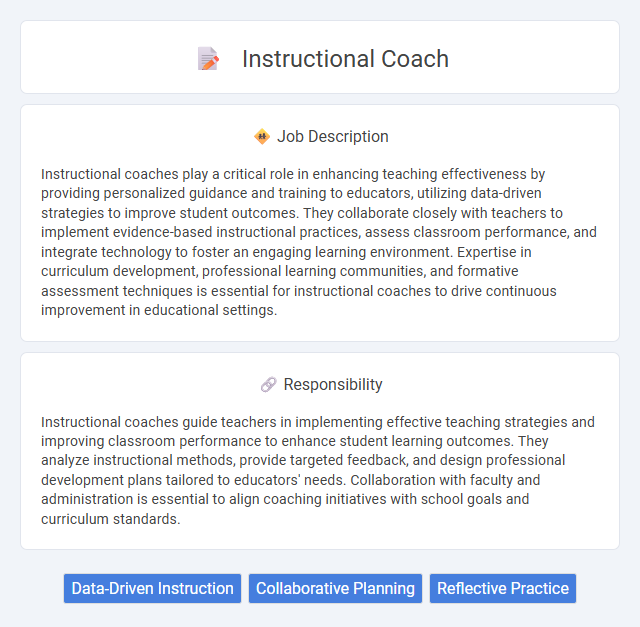
Instructional coaches play a critical role in enhancing teaching effectiveness by providing personalized guidance and training to educators, utilizing data-driven strategies to improve student outcomes. They collaborate closely with teachers to implement evidence-based instructional practices, assess classroom performance, and integrate technology to foster an engaging learning environment. Expertise in curriculum development, professional learning communities, and formative assessment techniques is essential for instructional coaches to drive continuous improvement in educational settings.
Individuals with strong communication skills, patience, and a passion for education are likely to excel as instructional coaches. Those who thrive in collaborative environments and enjoy supporting teachers in improving instructional strategies may find this role highly suitable. Conversely, people who prefer independent work and direct classroom teaching might struggle to adapt to the coaching demands.
Qualification
Instructional coaches typically require a master's degree in education or a related field, along with state teaching certification and several years of classroom teaching experience. Expertise in curriculum development, data analysis, and differentiated instruction enhances their ability to support educators effectively. Strong communication skills and knowledge of adult learning theory are essential qualifications for guiding teacher development and improving instructional practices.
Responsibility
Instructional coaches guide teachers in implementing effective teaching strategies and improving classroom performance to enhance student learning outcomes. They analyze instructional methods, provide targeted feedback, and design professional development plans tailored to educators' needs. Collaboration with faculty and administration is essential to align coaching initiatives with school goals and curriculum standards.
Benefit
Instructional coaches likely enhance teaching effectiveness by providing personalized support and feedback to educators, leading to improved student outcomes. Their guidance may promote professional growth and confidence among teachers, fostering a more collaborative and innovative school environment. Schools could see increased staff retention and academic achievement as indirect benefits of employing skilled instructional coaches.
Challenge
Instructional coaches probably face challenges related to balancing individualized teacher support with school-wide goals, often requiring adaptive strategies to meet diverse educational needs. Navigating resistance to change and fostering collaboration in a dynamic learning environment might be demanding aspects of the role. The necessity to stay updated with evolving pedagogical practices could also contribute to the complexity of the job.
Career Advancement
Instructional coaches play a crucial role in enhancing teaching strategies and improving student outcomes, making them valuable assets in educational institutions. Advancing in this career often involves gaining expertise in curriculum design, data analysis, and leadership skills to move into roles such as curriculum coordinator or instructional director. Continuous professional development and certifications in educational leadership significantly boost opportunities for career growth and higher-level administrative positions.
Key Terms
Data-Driven Instruction
Instructional coaches specializing in data-driven instruction analyze student performance metrics to tailor teaching strategies, ensuring improved learning outcomes. They collaborate with educators to interpret assessment data, identify learning gaps, and implement evidence-based interventions. This role requires expertise in data analysis tools and a deep understanding of curriculum alignment to enhance instructional effectiveness.
Collaborative Planning
Instructional coaches play a crucial role in collaborative planning by working closely with teachers to design effective lesson plans and align instructional strategies with curriculum standards. They facilitate data-driven discussions that help identify student needs and tailor interventions to improve learning outcomes. By fostering a culture of continuous improvement, instructional coaches enhance teamwork and promote shared accountability among educators.
Reflective Practice
Instructional coaches play a crucial role in fostering reflective practice among educators by guiding teachers to analyze their instructional strategies and student outcomes critically. They use data-driven feedback and collaborative discussions to help educators identify areas for improvement and implement effective teaching techniques. Reflective practice supported by instructional coaches leads to continuous professional growth and enhanced student achievement.
 kuljobs.com
kuljobs.com